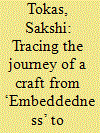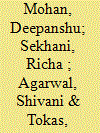| Srl | Item |
| 1 |
ID:
191790


|
|
|
|
|
| Summary/Abstract |
Karl Polanyi’s theories on embeddedness and disembeddedness help unpack the transformation of exchange systems and emergence of markets in societies. This paper analyses a process of such transformation observed in the context of the hand block printing industry of Jaipur and its nearby areas. Through an ethnographic study of the craft, we observe the extent to which hand block printing has undergone heavy commodification and commercialisation while disembedding from the society. Over the years, aspects of hand block printing, such as design, labour and authenticity, have changed for the worse, which has further impacted the socio-cultural identity of this craft and crafts(wo)men engaging in it. Some underlying forces behind this are the commodification of labour and the commercialisation of the craft. While expanding on these, the paper also provides policy recommendations on the aspects of recognising artists and standardising labels in the industry.
|
|
|
|
|
|
|
|
|
|
|
|
|
|
|
|
| 2 |
ID:
185974


|
|
|
|
|
| Summary/Abstract |
Karl Polanyi argues that the discipline of economics has emerged from the observations of human beings and their practices existing in a society. Since humans are perceived primarily as social beings rather than economic ones, embeddedness is a necessary and basic condition of the economy. This paper is an attempt to observe study and understand the inter-sectional application of these concepts of embeddedness and ethnic solidarity, in the socio-economic context of the Tibetan refugee community residing in India. Our study’s fieldwork was focused on observing the functioning of the local Tibetan economy in Mcleodganj (Dharamshala), where two Tibetan knowledge systems: the Thangka art and the Tibetan healing system were closely studied, reflecting Tibetan culture, and the community’s effort to preserve and promote these knowledge systems in different economic forms.
|
|
|
|
|
|
|
|
|
|
|
|
|
|
|
|